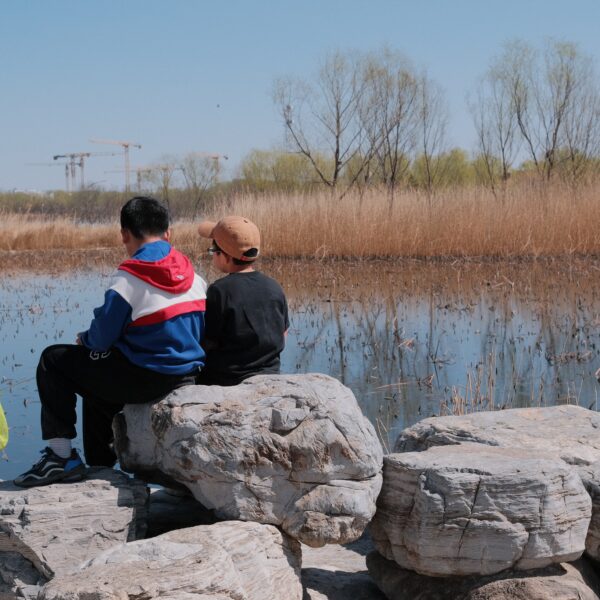Lismore director reflects on changes to children’s lives from fire, flood and pandemic

Sonya McPherson, Director of the East Lismore Community Preschool has contributed to a piece for local news source The Lismore App, reflecting on the experiences of children in the besieged New South Wales community, who have endured bushfires, a global pandemic and the 2022 flooding emergency in recent times, having an impact on their development.
A baby born in 2019, she points out, came into the Lismore community at a time when the community was on ‘high alert’ for seven months because of significant bushfires and their aftermath, which was then eclipsed by the presence of COVID-19 in the community.
Once COVID-19 was on the scene, the baby who is walking or crawling has limited social interaction opportunities, and encounters a world where the majority of people are wearing masks for close to two years.
Immediately after the pandemic, the 2019 baby, now a young child, lives through the most significant flood event in Lismore’s history, which included the closure of many community stalwarts, including preschools and playgroups.
These 2019 babies are now experiencing schooling, and their upbringing, Ms McPherson argues, has been anything but typical, compared with previous generations.
For the experienced early childhood professional, these observations are not only professional, but also personal, with one of Ms McPherson’s children having been born in January 2020.
Some of the challenges for preschoolers born in this bracket that she has observed include:
- Their capacity to read faces
- Their capacity to work
- How to speak/speech delays
- How to generally communicate
- How to play
- How to take turns
Even seemingly simple things, like two children walking in a line, she continued, are challenging.
“Getting them to do anything other than with that same person, trying to constantly get them to mix it up. How to share, emotionally regulate, how to build bonds with more than one person,” she explained.
“What we’ve noticed, last year and this year, is we’re putting in much larger requests for children to be allowed to start primary school a year later because they’ve not had the exposure. The 2019 children are now in grade five. They’ve gone through COVID lockdowns, homeschooling, lack of contact with the community and community-acquired diseases that normally children under three would get, didn’t get.”
“The health impacts are really quite significant. It’s not just about their immunity; it’s even right down to if you don’t have enough access to colds for ear, nose and throat to properly flow through them to experience what that’s like and how to maintain it. To build up the microbiome all the way through the body. All of that starts to bounce.”
“Children simply don’t know how to play,” she said. “If you think about a board game and the capacity to wait your turn, this all links into stuff that they’re going to do at school later. They don’t have the same capacity, so the fine motor, pencil grip, gross motor, we’re noticing lots of children whose physical core is really floppy. It looks like they’ve actually got processing disorders and so we brought on a speech and occupational therapist (OT) here.”
“Some children have missed basic steps because they’ve been on the floor or they’ve been in front of screen time for too long and so by age two and a half to three, a child should be able to put a spoon in a bowl, the bowl moves and they put their hand there to stop it.”
“They haven’t got the core strength for the crossover collaboration. So, the OT is now trying to get us to literally go back and do things that they should have done when they were 18 months old because it looks like the body doesn’t work, but actually, it hasn’t been supported to do so because they’ve not been running around and playing and climbing and risk-taking and knowing how to take risks safely, being taught how to take risks safely.”
As a community, the flooding event eroded a sense of connection, and Ms McPherson is seeing trauma responses from residents.
With the offering of buybacks in Lismore, the preschool is now getting three to five referrals per day for people wanting to be placed in the service or on the waitlist.
“What we’re noticing is there is, literally, a complete migration happening. So people are either getting the buybacks or getting their houses moved, people are constantly searching,” she explained.
“The two large daycares have moved out of town, and so you’ve got a couple of nonprofit preschools and development applications in for Goonellabah. You have two to three-year wait lists on all daycare settings at the moment. That’s like Sydney, they’re Sydney numbers.”
Ms McPherson would like to see a larger conversation being held at state and federal level about the impact of the collective experiences of children who have grown up in this tumultuous time of Lismore’s history.
“Remember, you are not alone,” she said, speaking directly to local parents.
“Lots of children and families are going through the same thing, you just don’t realise it because we all say we are okay.”
Read the original coverage of this story here. Image shows one of the many letters and offerings of support shared with the preschool.
Popular

Quality
Provider
Policy
Practice
WA approved provider fined $45,000 over bush excursion incident
2025-07-01 07:00:01
by Fiona Alston

Workforce
Policy
Quality
Practice
Provider
Research
ECEC must change now, our children can’t wait for another inquiry
2025-07-02 07:47:14
by Fiona Alston

Quality
Practice
Provider
Workforce
Child left in storeroom at Sydney centre sparks concerns over supervision and trauma support
2025-06-30 09:09:58
by Fiona Alston













